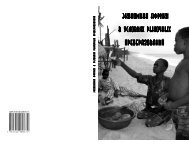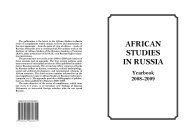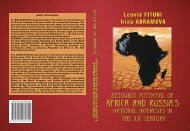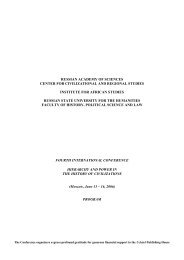Bondarenko Dmitri M. Homoarchy
Bondarenko Dmitri M. Homoarchy
Bondarenko Dmitri M. Homoarchy
You also want an ePaper? Increase the reach of your titles
YUMPU automatically turns print PDFs into web optimized ePapers that Google loves.
22<br />
(and furthermore distant) cultures’ responses to the same essential problems<br />
turn out so different that the cultures eventually take essentially different<br />
evolutionary paths.<br />
On the other hand, hardly it is correct to talk about a certain<br />
homogeneous “European historical experience” in the socio-political sphere.<br />
To realize it, it is enough to compare the semantics of the words denoting<br />
political organization in different European languages. For example, state in<br />
English or Йtat in French means not only the political system but also<br />
“condition.” So, in such a context the state is a specific condition of society<br />
into which political power is inserted; the former is primary towards the latter.<br />
On the contrary, in Russian the respective word – gosudarstvo is derived from<br />
gosudar’ – “sovereign”, so power, not society is seen as the basic, dominant<br />
category: the state is not a society to which power serves but is a property of<br />
the sovereign to whom the society due services. In any case, the state of the art<br />
in state studies by now is such that we may ascertain safely that the two<br />
characteristics – political centralization (either in the sense of “the<br />
‘concentration’ of power in the hands of a few” [Roscoe 1993: 113; see also,<br />
e.g., Morris 1998: 293], or “the degree of linkage between the various<br />
subsystems and the highest-order controls in society” [Flannery 1972: 409; see<br />
also, e.g., Cohen 1978b: 45–46], or both) and specialization of administration,<br />
still form the backbone of the theory of the state in general. It is also<br />
recognized, hardly not as a common place, that “… the expansion of the<br />
administration, and more especially the trend towards bureaucratization in the<br />
early state were closely connected with centralization” (Skalnнk 1978: 600). If<br />
these characteristics are adequate and sufficient, is another point to which I will<br />
return and on which will elaborate below.<br />
2. The state: “to be or not to be?”<br />
Allotting the state common universal characteristics does not a priori mean that<br />
any sufficiently complex society is “obliged” to acquire them. This idea could<br />
have seemed very simple if it had not taken it so long to penetrate into<br />
anthropological theory, or better to say, into some of contemporary<br />
anthropological theories. The initial step was made with the first attempts to<br />
escape from unilinear evolutionism 13 that declared state formation as a<br />
teleological goal of the socio-political process marked by perpetual progressive<br />
move to greater overall socio-cultural complexity, most significantly expressed<br />
by, and concentrated in the growth of political centralization and social<br />
stratification. Within evolutionism these attempts were made only in the mid-<br />
20 th century. During the preceding period in Western Europe and North<br />
America evolutionism turned out so unattractive, mainly just due to its<br />
unilinearity, that even those classics of that time who by no means rejected the<br />
very idea of evolution (e.g., Boas [1940: 270–280], Lowie [1948: 32–53],<br />
Radcliffe-Brown [e.g., 1947; see also Carneiro 2003: 82–85]) were not







